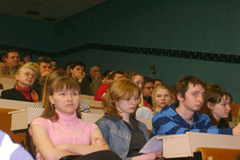Analytics, Baltic, Education and Science
International Internet Magazine. Baltic States news & analytics
Monday, 22.12.2025, 20:01
Baltic students choose to study abroad
 Print version
Print version |
|---|
At least 50% of the students from the Baltic"s best secondary schools will attend university abroad, Remigijus Simasius, president of the Lithuanian Free Market Institute, a research group in Vilnius, told Bloomberg/ELTA. His estimate is based on talks with educators, students and state agencies. He didn"t provide earlier figures, though this year is a peak, he said.
Like thousands of other college- bound Lithuanians, Edgaras Predkelis spent the past year filling out paperwork and studying for exams to get into Vilnius University, the nation"s most prestigious school. Then he enrolled at the University of Amsterdam, where he starts classes next week.
"You get a much better education for the same amount of money in Holland,"" said Predkelis, 19. At Vilnius, his mother"s alma mater," you don"t get the quality, the right equipment or the attention. I don"t like that.""
Predkelis, who will study international economics, said almost all of his high school"s English class of 25 and more than half of the 130-person graduating class is leaving.
The acceptance letter to Vilnius was required by Amsterdam to study there, at a cost of 1,500 euros (2,200 US dollars) a year.
"There is just no motivation to keep the brightest students,"" says Simasius. "The Baltic brain drain is an issue everyone is talking about, but there is not enough reform.""
Stockholm-based SEB AB, the second-biggest bank in the Baltics, and Vilnius-based Fermentas UAB, the region"s largest biotechnology company, are trying to ease the education system"s faults with their own programs.
Fermentas accepts 20 students a year for training, said chairman and founder Viktoras Butkus.
"Most of the teachers here don"t even do their own research or have contact with industry,"" said Butkus. "We want our students to learn how to turn their ideas into products that end up in the company catalog.""
SEB"s Lithuanian personnel director, Jolita Lauciuviene, said the bank retrains local graduates for six months after employment to ensure they are qualified.
"University education is perceived as a must and now we are suffering,"" said Laura Guobuzaite, a director at the Lithuanian Development Agency. "We need quality.""
The Baltics were once part of the Soviet educational system, whose graduates launched the world"s first satellite, produced a nuclear program that rivaled that of the U.S. and included writers such as 1987 Nobel Prize-winning poet Joseph Brodsky, who penned "The History of the Twentieth Century.""
With the fall of Communism, former Soviet satellites have to pick up all their education costs – as they also pare spending to meet the fiscal requirements for euro adoption.
In 1999, Estonian public spending on education accounted for 6.1% of gross domestic product, according to Eurostat, the EU"s statistics agency. In 2005, the last year of available figures, the%age fell to 4.87%.
In Lithuania, education spending fell to 4.95% of GDP from 6.13% in 1999, and Latvian spending dropped to 5.06% from 5.8%. That compares with 8.2% of GDP in nearby Denmark and 6.97% in Sweden.
In a Vilnius University laboratory at the end of a gloomy hall, stacked high with scarred wooden desks and chairs, 42- year-old chemistry professor Arunas Ramanavicius was overseeing a group of summer-session students.
They took turns peering into a 500,000 US dollars microscope paid for six months ago with a private grant. The purchase generated 10 kilos (22 pounds) of state paperwork and took two people two days to sign, Ramanavicius said.
That level of bureaucracy, plus two other jobs that supplement his income, means Ramanavicius can"t do the research he needs to stay current in his field and hold proper office hours for students, he says.
"It"s a bad situation,"" Ramanavicius told Bloomberg. "The general salary is so terrible, I have to have other activities. I need to feed my family."" University teachers" salaries can be as much as 30% lower than the average monthly gross state wage of 933 US dollars, according to the Lithuanian State Audit Office.
In Estonia, a 2006 survey of 200 scientists by the Education Ministry showed "financing issues, in terms of pay, grants and infrastructure"" were considered the biggest problem.
"Study laboratories are in very poor condition or do not exist at all,"" the Estonian ministry said on the Web site.
Because of that, Predkelis sees no reason to come back after his studies in Amsterdam, which he said will give him the hands-on training to let him pursue his dream of working in finance in London.
"Experience is really important"" in education, said Predkelis, sipping an espresso in a Vilnius coffee shop. "You won"t be a good, bright person unless you have experience.""








 «The Baltic Course» Is Sold and Stays in Business!
«The Baltic Course» Is Sold and Stays in Business!

